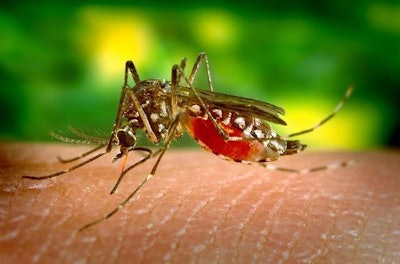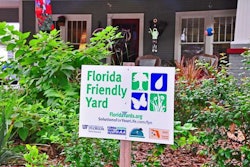 There are over 3,000 species of mosquitoes in the world and about 200 species are found in the United States.
There are over 3,000 species of mosquitoes in the world and about 200 species are found in the United States.Photo: Pixabay
No one wants to have a beautiful backyard but be unable to enjoy it due to bothersome mosquitoes. If this is a problem your clients experience – especially if they’re not fans of bug spray – let them know they have options in managing their mosquito invasion.
Prevention
The best way to not have mosquitoes is to stop them from ever finding your client’s backyard desirable.
Make sure the landscape does not have areas of standing water, which is where mosquitoes lay their eggs. Downspouts should be checked so that they do not leave puddles in drainage areas.
If your client has a pond, suggest adding fish that feed on mosquito larvae or using mosquito dunks. The dunks contain Bacillus thuringiensis, which kills mosquito larvae and does not harm fish, pets, wildlife or humans.
According to Coldwell Banker, replacing lighting with yellow bulbs attracts fewer mosquitoes as well. Also, mosquitoes are generally weak fliers, so keeping a fan around will help deter them.
Offer an organic alternative
There are plenty of companies that offer to fog backyards with chemicals, but offering natural solutions could help set your services apart from the competition.
Bonick Landscaping, based in Dallas, Texas, uses formulas that are safe for pets and people. For special occasions, 24-hour treatments are used. Pyrethrin, refined from chrysanthemum plants, is able to paralyze mosquitoes, but does not kill them. It is also degraded by the sun so there is no residue.
Bonick Landscaping also offers a garlic-based solution, which serves as a repellant rather than an insecticide.
They recommend the MistAway control system for clients who need consistent mosquito control. Comak Bros. Landscaping in Peabody, Massachusetts, also offers MistAway for clients. The system mixes the contents so that each spray has a good blend of the active ingredients and also has a wind sensor that monitors the wind speed before each scheduled cycle.
Other companies provide a spraying service. Foley and Son Landscaping in North Attleboro, Massachusetts, uses a liquid garlic solution that is sprayed on grassy areas. The treated areas are safe to enter as soon as the spraying is done.
In New York City, Bob DeStaso Landscaping offers a spraying service that takes out ticks as well as mosquitoes. Its ingredients include cedar oil, which impairs the insects’ mental capabilities, and raspberry bio-solvent, which eats through the insects’ exoskeletons. This spray has to be applied monthly, but the company also does one-time sprayings.
Go Green Landscaping in Scarborough, Maine, uses a mixture of botanical oils such as wintergreen, rosemary and peppermint in its spray.
Minuteman Landscaping, another Massachusetts-based company, has a two-step organic treatment, eliminating the eggs first and then applying a “Granular Mosquito Repellant,” which is said to create an invisible barrier.
Give them the facts
While the internet is full of helpful facts, it’s chock-full of bogus information as well. You may need to make it clear to your clients that mosquito-repelling plants are a myth.
The names of plants that are supposed to have this magical power vary a little depending on which list you come across, but the main suspects are lemon balm, citronella, marigold, lavender, peppermint, floss flower, tansy, rosemary, basil and catnip.
The key piece of information that’s normally left out on these websites is how “mosquito-repelling plants” actually work. Some of the plants mask the scent mosquitoes hone in on to find their prey: carbon dioxide. Lavender, thyme and geranium are plants that are said to make it harder for mosquitoes to find you.
Other plants, such as tansy, are said to have a putrid scent that drives the insects away.
To the extent that any of the plants can actually help keep mosquitoes away, crushing the leaves to release the oils, or burning them, is more effective than simply having some nearby in a pot.
Finally, it wouldn’t hurt to tell clients a simple truth: None of these methods will be nearly as successful as DEET-based repellants. According to BugOfff.com, botanical repellants have to be re-applied up to four times more often and shouldn’t be depended on for serious mosquito protection.










